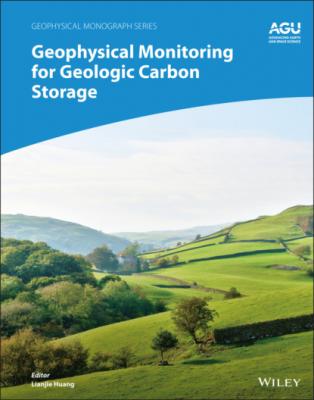Geophysical Monitoring for Geologic Carbon Storage. Группа авторов
Читать онлайн.| Название | Geophysical Monitoring for Geologic Carbon Storage |
|---|---|
| Автор произведения | Группа авторов |
| Жанр | География |
| Серия | |
| Издательство | География |
| Год выпуска | 0 |
| isbn | 9781119156840 |
Alexandra Ivanova Centre for Geological Storage GFZ German Research Centre for Geosciences Potsdam, Germany
Paul Jaques Schlumberger Cambridge, UK
Christopher Juhlin Department of Earth Sciences Uppsala University Uppsala, Sweden
Timothy Kneafsey Earth and Environmental Sciences Lawrence Berkeley National Laboratory Berkeley, California, USA
Juliane Kummerow Centre for Geological Storage GFZ German Research Centre for Geosciences Potsdam, Germany
Axel Liebscher Centre for Geological Storage GFZ German Research Centre for Geosciences Potsdam, Germany
Youzuo Lin Geophysics Group Los Alamos National Laboratory Los Alamos, New Mexico, USA
Stefan Lüth Centre for Geological Storage GFZ German Research Centre for Geosciences Potsdam, Germany
Trond Mannseth NORCE Norwegian Research Centre AS Bergen, Norway
Ronald Martinez Chemistry Division Los Alamos National Laboratory Los Alamos, New Mexico, USA
Brian McPherson Energy and Geoscience Institute University of Utah Salt Lake City, Utah, USA
Sjef Meekes TNO Utrech, The Netherlands
H. Frank Morrison University of California at Berkeley Berkeley, California, USA
Alan Mur Ikon Science Ltd Houston, Texas, USA
Seiji Nakagawa Earth and Environmental Sciences Lawrence Berkeley National Laboratory Berkeley, California, USA
Yuji Nishi Research Institute for Geo‐Resources and Environment Geological Survey of Japan National Institute of Advanced Industrial Science and Technology Ibaraki, Japan
Ben Norden Centre for Geological Storage GFZ German Research Centre for Geosciences Potsdam, Germany
Kristy Nowak‐Lovato Chemistry Division Los Alamos National Laboratory Los Alamos, New Mexico, USA
Christopher Purcell CNOOC International Houston, Texas, USA
Etor Querendez Applied Geoscience Group SINTEF Industry Trondheim, Norway
Anouar Romdhane Applied Geoscience Group SINTEF Industry Trondheim, Norway
Alessio Rucci TRE ALTAMIRA Srl Milan, Italy
Sergey Samsonov Canada Centre for Mapping and Earth Observation Natural Resources Canada Ottawa, Ontario, Canada
Cornelia Schmidt‐Hattenberger Centre for Geological Storage GFZ German Research Centre for Geosciences Potsdam, Germany Xuefeng Shang Geophysics Group Los Alamos National Laboratory Los Alamos, New Mexico, USA
Yee Soong Leidos Corporation National Energy Technology Laboratory U.S. Department of Energy Pittsburgh, Pennsylvania, USA
Lee H. Spangler Energy Research Institute Montana State University Bozeman, Montana, USA
Sirui Tan Geophysics Group Los Alamos National Laboratory Los Alamos, New Mexico, USA
Svenn Tveit NORCE Norwegian Research Centre AS Bergen, Norway
Donald Vasco Energy Geosciences Division Lawrence Berkeley National Laboratory Berkeley, California, USA
Florian Wagner Department of Geophysics Steinmann Institute University of Bonn Bonn, Germany
Yi Wang Geophysics Group Los Alamos National Laboratory Los Alamos, New Mexico, USA and Laboratory of Seismology and Physics of Earth’s Interior School of Earth and Space Sciences University of Science and Technology of China Hefei, China
Don White Geological Survey of Canada Natural Resources Canada Ottawa, Ontario, Canada
Robert Will WRG Subsurface Consulting LLC Littleton, Colorado, USA
Xianjin Yang Atmospheric, Earth, and Energy Division Lawrence Livermore National Laboratory Livermore, California, USA
Fengjiao Zhang Department of Earth Sciences Uppsala University Uppsala, Sweden
Zhifu Zhang Geophysics Group Los Alamos National Laboratory Los Alamos, New Mexico, USA and School of Geophysics and Information Technology China University of Geoscience Beijing, China
Zhigang Zhang Geophysics Group Los Alamos National Laboratory Los Alamos, New Mexico, USA
PREFACE
Geologic carbon storage is the storage of carbon dioxide, generally in supercritical form, in underground geological formations. This kind of underground storage is emerging as a promising technology for dealing with increasing concentrations of carbon dioxide in Earth's atmosphere. Ensuring safe and long‐term CO2 storage in different subsurface settings requires site characterization and monitoring during and post‐CO2 injection. A range of geophysical monitoring techniques can be deployed in this regard, to remotely track subsurface CO2 plumes and to monitor fracture/fault zones (one of the primary leakage paths), caprock integrity, and mineralogical changes. This book provides a comprehensive reference to different geophysical techniques currently used and being developed for monitoring geologic carbon storage and for assessing their advantages and limitations.
The book is divided into four parts, three describing different monitoring methods and techniques and one presenting case studies from around the world. Part I contains two chapters on geodetic and surface monitoring techniques, specifically Interferometric Synthetic Aperture Radar (InSAR) and frequency modulated spectroscopy. Part II looks at subsurface monitoring using seismic techniques, including optimal design for cost‐effective monitoring using microseismic networks and time‐lapse active seismic surveys; offset, walkaway, and 3D vertical seismic profiling (VSP) monitoring/imaging; quantifying time‐lapse changes of subsurface geophysical properties; site characterization using multicomponent seismic data; and workflows for determining fluid and pressure effects resulting from a supercritical CO2 injection in a sandstone reservoir using 4D reflection seismic data and well logs. Part III looks at subsurface monitoring using nonseismic techniques with chapters on time‐lapse gravity surveys; electrical and electromagnetic techniques; electrical resistivity tomography; integrated controlled source electromagnetic (CSEM), gravimetric, seismic amplitude‐versus‐offset (AVO) monitoring; and self‐potential monitoring. Finally, Part IV presents five case studies of geophysical monitoring at different geologic carbon storage sites. The first three are in the United States: the Illinois Basin‐Decatur Project in Decatur, Illinois; Phase III of the Southwest Partnership on Carbon Sequestration in Farnsworth, Texas; and the Southeast Regional Sequestration Partnership project in Cranfield, Mississippi. Two further examples are presented from Europe: the Sleipner project in Norway, and the CO2 injection project at Ketzin in Germany.
I thank all the authors for their contributions and numerous reviewers for their careful review of the chapter manuscripts. Appreciation also goes to AGU and Wiley for their support during the preparation and production of this book. Particularly, I thank Dr. Estella Atekwana from the AGU Books Editorial Board and the AGU Publications Director, Dr. Jenny Lunn, for helpful feedback on the manuscript. I also express gratitude to staff at Wiley, including Dr. Rituparna Bose, Emily Bae, Kathryn Corcoran, Poornima Devi, Layla Harden, Karthiga Mani, Nithya Sechin, Bobby Kilshaw, Carol Kromminga, Angela Cohen, Shiji Sreejish, and Bhavani Ganesh Kumar for their support.
Lianjie Huang Los Alamos National
